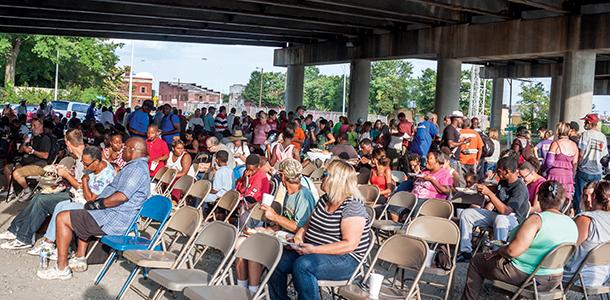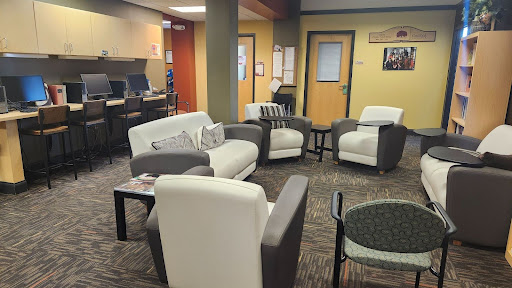Homelessness: an American crime
Worshipers sit at Church Under the Bridge, an open-air church service and meal for people experiencing homelessness downtown.
Sometimes, the meat-and-potatoes of your existence is not food. It is extra socks, empty water bottles and a beat-up flip phone with just a few minutes of air time left.
For G, whose name has been abbreviated, and the other 900 individuals who currently identify as homeless in Guilford County, this is just reality.
“I’ve been here on West Wendover Avenue for 10 years and sober for 12,” G said, holding a cardboard sign that simply reads “homeless sober vet.”
“I have family I could stay with in Salisbury, two daughters. They ask me, ‘Why don’t you just stay with us?’ But I could never burden them like that.”
In September, President Barack Obama made an affirmative stance in federal court, rejecting Republican efforts to continue criminalizing homelessness. His administration filed a brief arguing that the criminalization violated the Eighth Amendment, which protects Americans from cruel and unusual punishment.
A year earlier, the U.N. Human Rights Committee made a similar condemnation, stating that a country, which prides itself on being exceptional, routinely mistreats and degrades millions of homeless.
“Homeless people in Guilford County absolutely are victimized,” said junior Connor Pruitt, current project coordinator for Church Under the Bridge.
“Many shelters have policies where the homeless can only spend a fixed amount of nights in them annually. Police also have discretion regarding the selective enforcement of policies, resulting in unequal treatment.”
Here in the Triad, encounters with law enforcement vary. A source that wished to remain anonymous summed up their experience.
“My encounters with the police haven’t been overwhelmingly positive,” they said. “I live in an apartment with my girlfriend now, but spent close to a decade homeless and living like a vagabond.
“Whether it was being chased from the woods, abandoned buildings and cars, I would eventually find a place to sleep. It just seemed like a waste of energy on (the police’s) part to me.”
Three states and 125 social justice groups have collaborated to put together a Homeless Bill of Rights designed to protect those that are more vulnerable.
“I would say 90 percent of cops are respectful,” G said. “I have never felt like a criminal, but there are those few who get up in your face, whether you are standing out with a sign or just trying to sleep and (they) demand you move. You have to do what they say.”
In August, the United States Department of Justice filed a statement of interest against Boise, Idaho, for imposing anti-camping laws against homeless people. Their argument rested on two key Supreme Court cases, Robinson v. California and Powell v. Texas, which both dealt with criminalizing drug addiction and alcoholism.
Together, both court cases determined that cities cannot arrest homeless people for sleeping outside when shelters are at capacity. Doing so would effectively criminalize homelessness.
“This criminalization started in the late 1970s,” Assistant Professor of Political Science Robert Duncan said. “After World War II, veterans, for example, were given the GI Bill and Federal Housing Administration low-interest mortgages.
“They were encouraged to find a job, buy homes and go to school. We supported those guys. Where is that now?”
Each year, the Department of Housing and Urban Development gives out $1.9 billion in grants to local Continuums of Care. Applicants are required to fill out a lengthy questionnaire detailing how they plan to use the money and describe their current policies.
To ensure the humane treatment of those in need of their services, HUD has recently announced that if public-private partnerships collaborate with police departments and local governments that criminalize homelessness, they will refuse to dole out those grants.
“My friend Jesse has been homeless for 10 years now,” said former project coordinator for Church Under the Bridge Noelle Lane ‘15. “And he’s so close to being housed.
“What he and many others in his situation need is someone to take the time to teach the basic skills needed to live, not a criminal history.”










